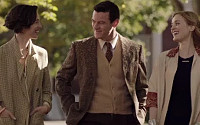| SHADOWS ON THE WALL | REVIEWS | NEWS | FESTIVAL | AWARDS | Q&A | ABOUT | TALKBACK | |||
| Professor Marston and the Wonder Women | |||

| |||
|
dir-scr Angela Robinson prd Terry Leonard, Amy Redford with Luke Evans, Rebecca Hall, Bella Heathcote, JJ Feild, Chris Conroy, Oliver Platt, Connie Britton, Monica Giordano, Maggie Castle, Alexa Havins, Sharon Kubo, Allie Gallerani release US 13.Oct.17, UK 10.Nov.17 17/US 1h48  A radical family: Hall, Evans and Heathcote 


TORONTO FILM FEST  |
R E V I E W B Y R I C H C L I N E | ||
 If you've never read how Wonder Woman was created, you might need to brace yourself for this film. Because in exploring the lives of the Harvard brainiacs behind the first and most popular female superhero, the filmmakers dip into a counterculture lifestyle that would have tongues wagging now, let alone in the 1920s. It's also a sharply well written and directed film, with a solid cast that brings depth to the characters.
If you've never read how Wonder Woman was created, you might need to brace yourself for this film. Because in exploring the lives of the Harvard brainiacs behind the first and most popular female superhero, the filmmakers dip into a counterculture lifestyle that would have tongues wagging now, let alone in the 1920s. It's also a sharply well written and directed film, with a solid cast that brings depth to the characters.
In the mid-1920s, Bill Marston (Evans) and his wife Elizabeth (Hall) are psychology professors at Harvard, where they invent the lie detector and hire Olive (Heathcote) as an assistant. Elizabeth says she's fine that Bill flirts with Olive, although she can't help but feel pangs of jealousy until she discovers that Elizabeth is actually in love with her. As they try to work through these complex feelings, Bill is struggling to write another book, so he channels his progressive ideas into a comic book about a super-powered Wonder Woman. And her comics outsell Superman. The film is framed with a mid-1940s interview between Bill and the head of the Catholic decency league (Britton), who is annoyed by the comics' use of female empowerment and sadomasochistic imagery. Of course, she doesn't know about Bill's three-way relationship, during which he fathered two children each with Elizabeth and Olive, both of whom inspired aspects of the Wonder Woman character. The film uses this relationship to create friction in the story, both in various communities and between Elizabeth and Olive. Evans is engaging as the resolutely open-minded Bill, who clearly believes that women are innately more honest and powerful than men. He's charming and almost eerily unruffled by obstacles that come along, never proactively trying to solve problems. Hall's Elizabeth is a more troublesome character, reactionary and erratic, never quite getting her jealous impulses under control. This sometimes feels rather contrived, especially within this family situation. Opposite them, Heathcote's Olive feels rather less defined, feisty but passive. Thankfully, these contradictory character details add to the complexity, creating intriguing and believable people. The relationship between Bill, Elizabeth and Olive has strongly emotional currents that are both under-explored and sometimes manipulated for plot purposes. But writer-director Robinson cleverly depicts how people seize sensational details and miss the point of a story. In other words, this film may outline the creation of Wonder Woman, but it's perhaps more important as a look at how society responds to outsiders who have bold ideas.
| |||
| R E A D E R R E V I E W S | |||

 Still waiting for your comments ... don't be shy.
Still waiting for your comments ... don't be shy.
| |||
© 2017 by Rich Cline, Shadows on the Wall HOME | REVIEWS | NEWS | FESTIVAL | AWARDS | Q&A | ABOUT | TALKBACK | |||
